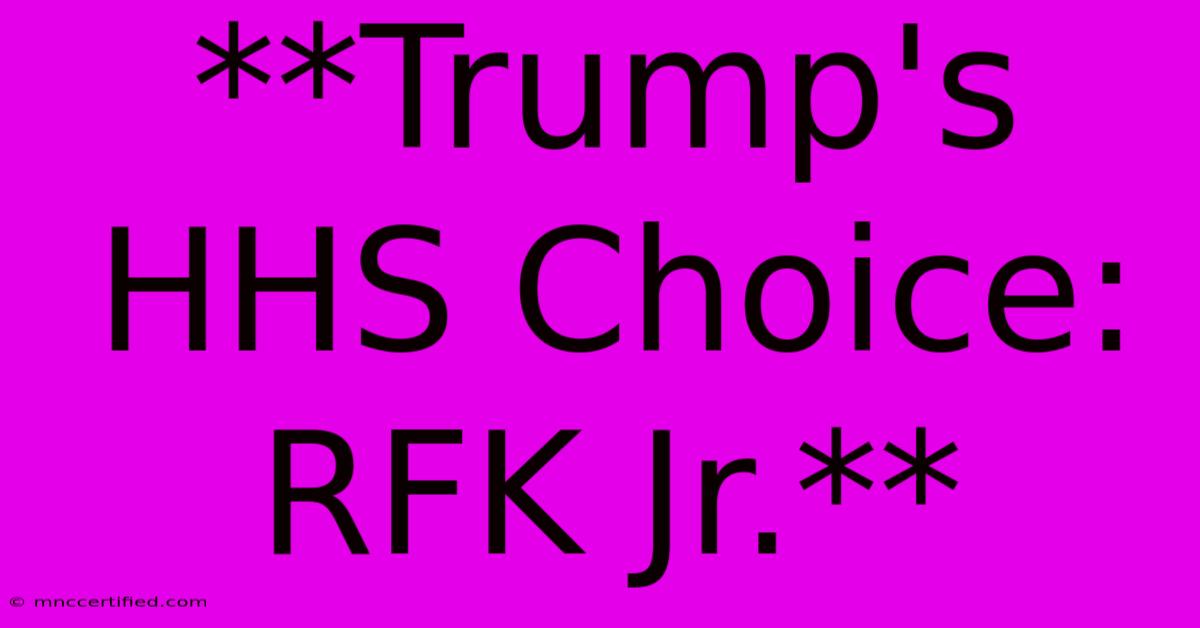**Trump's HHS Choice: RFK Jr.**

Table of Contents
Trump's HHS Choice: RFK Jr. - A Controversial Pick for Health
The potential nomination of Robert F. Kennedy Jr. as the head of the Department of Health and Human Services (HHS) under a potential Trump 2024 administration has sent shockwaves through the political and medical spheres. While Kennedy boasts a prominent name and a legacy of activism, his outspoken views on vaccines and other public health issues have raised serious concerns.
RFK Jr.'s Anti-Vax Stance: A Major Point of Contention
RFK Jr. is a well-known figure in the anti-vaccine movement. He has repeatedly made claims that vaccines are linked to autism, despite overwhelming scientific evidence to the contrary. His views have been widely criticized by the medical community, with many experts labeling them as dangerous and misleading. This stance has led to a significant amount of controversy, particularly as it could potentially undermine public health efforts to combat vaccine-preventable diseases.
Beyond Vaccines: A Broader Spectrum of Concerns
While his anti-vaccine stance is the most prominent, Kennedy's controversial views extend beyond vaccinations. He has also expressed skepticism about the safety of genetically modified foods, advocated for the use of alternative medicine, and raised doubts about the effectiveness of climate change mitigation efforts. These views have raised concerns about his ability to lead the HHS, an agency responsible for overseeing public health policies and programs.
RFK Jr.'s Potential Impact on the HHS
If appointed, RFK Jr. could potentially have a significant impact on the HHS. He might:
- Reverse existing vaccination policies: This could lead to a decline in vaccination rates, increasing the risk of preventable diseases.
- Promote alternative medicine over evidence-based practices: This could undermine the credibility of public health recommendations and potentially lead to harmful outcomes.
- Reduce funding for public health programs: This could negatively impact efforts to address major health issues such as obesity, heart disease, and cancer.
Potential Benefits and Challenges of RFK Jr.'s Candidacy
While Kennedy's controversial views have sparked widespread criticism, some see his potential nomination as a positive sign. His strong environmental advocacy and focus on public health issues could potentially contribute to positive changes within the HHS. However, the potential risks associated with his anti-vaccine stance and other unorthodox views are significant.
Conclusion: A Highly Divisive Appointment
The potential appointment of Robert F. Kennedy Jr. to lead the Department of Health and Human Services is a highly divisive one. While his public health activism and environmental advocacy are commendable, his controversial views on vaccinations and other health issues raise serious concerns about his ability to effectively lead the agency. Ultimately, the decision on his nomination will have far-reaching implications for the future of public health in the United States.
Keywords: Robert F. Kennedy Jr., RFK Jr., HHS, Department of Health and Human Services, Trump, anti-vaccine, vaccines, autism, public health, alternative medicine, genetically modified foods, climate change, controversy, potential benefits, potential risks, divisive.

Thank you for visiting our website wich cover about **Trump's HHS Choice: RFK Jr.** . We hope the information provided has been useful to you. Feel free to contact us if you have any questions or need further assistance. See you next time and dont miss to bookmark.
Featured Posts
-
What Does Surety Bond Mean In Jail
Nov 15, 2024
-
Anne Hathaway Sings Mary Poppins On Snl
Nov 15, 2024
-
Pitbull Tour Tickets Uk And Europe Leg
Nov 15, 2024
-
Eagles Take Lead Hurts Shove Td
Nov 15, 2024
-
Live Updates Taylor Swift Fans In Toronto
Nov 15, 2024